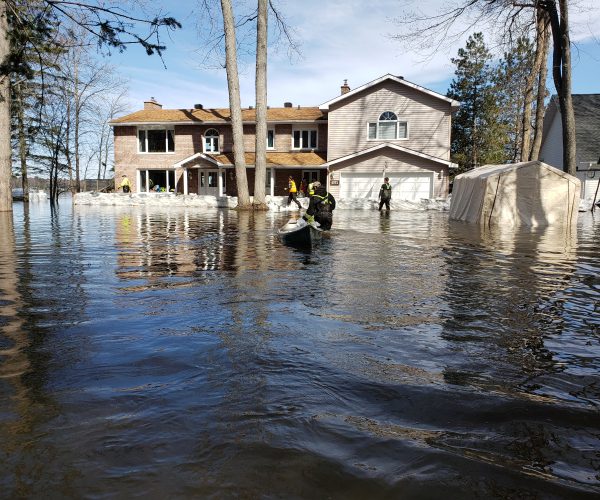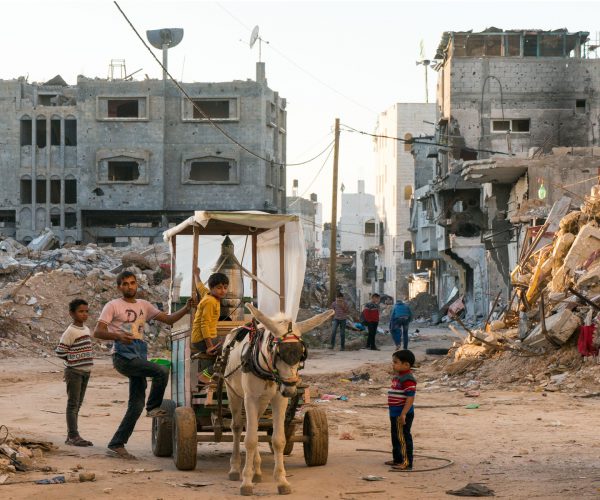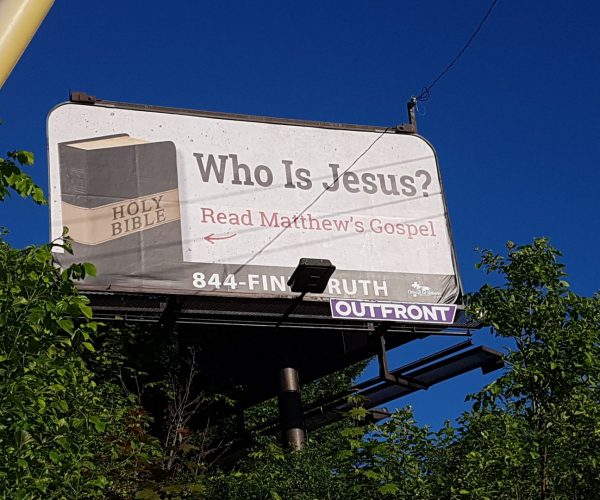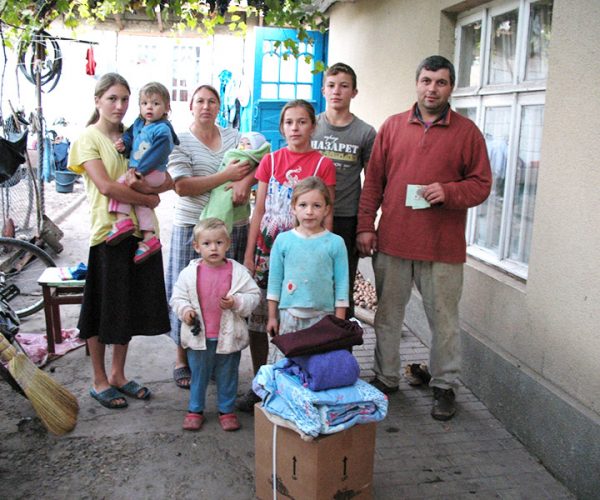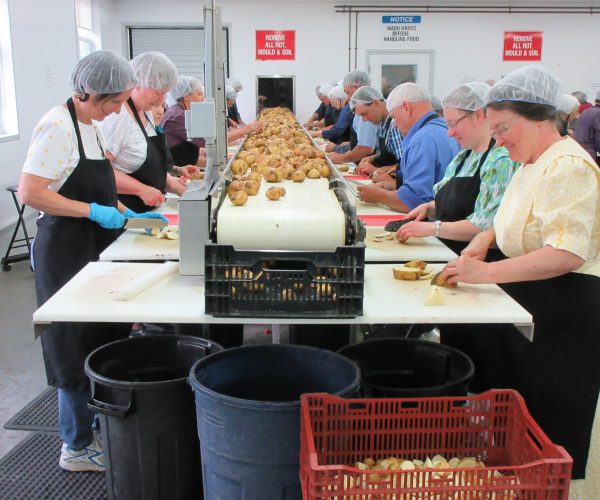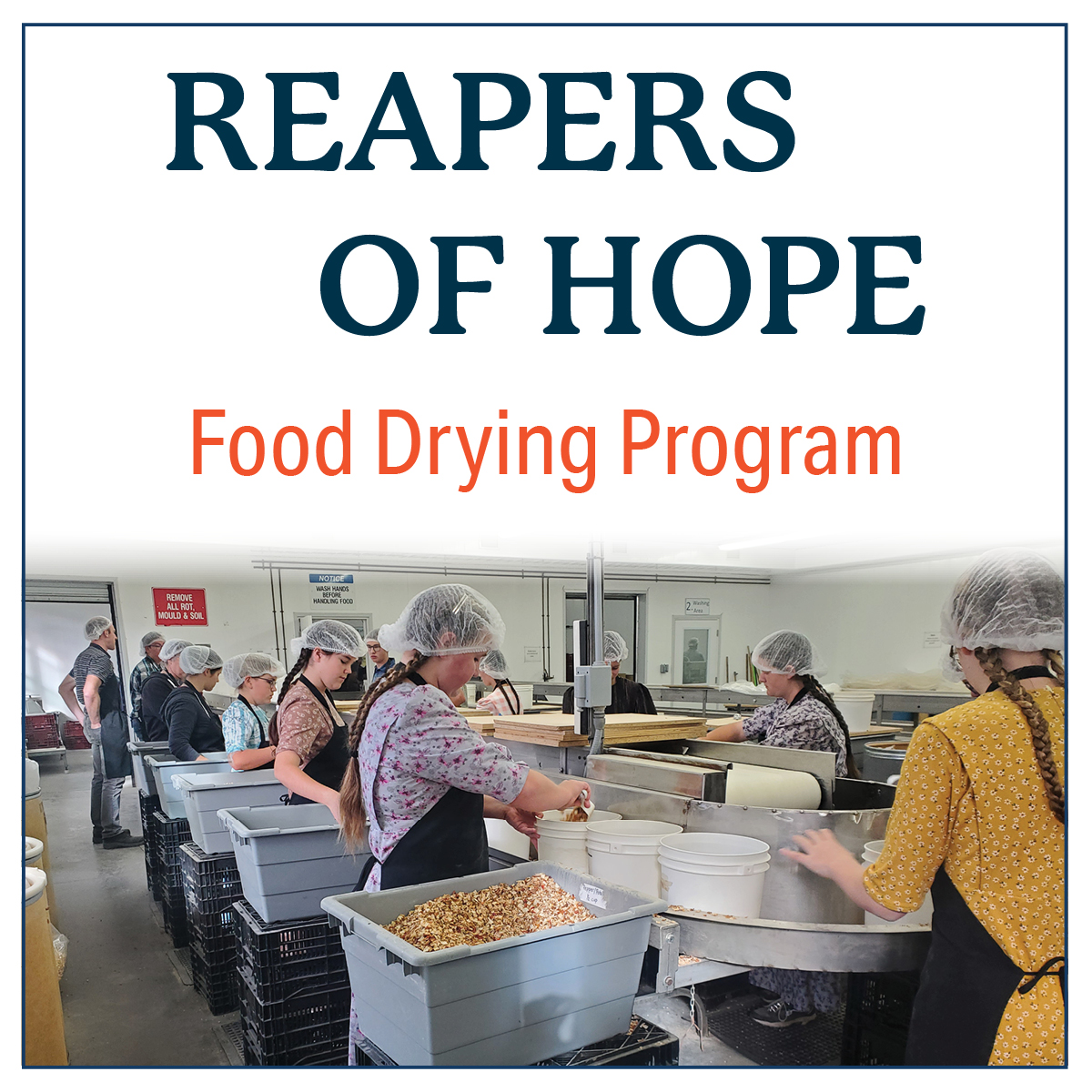“You came just in time.” The woman’s lip trembled, and she looked away. “I’ve been so discouraged and depressed. You came just in time.”
She held a food parcel, but I knew she was not starving. It was not that the food would save her life, and yet maybe, just maybe, it would. Not the food itself, but the gift of hope it represented.
She was just one of the many who received a food parcel that day. The parcel she held was one of the thousands that are packed every week. We cannot save Ukraine. We cannot stop the war. But, perhaps, for one person we can make a difference.
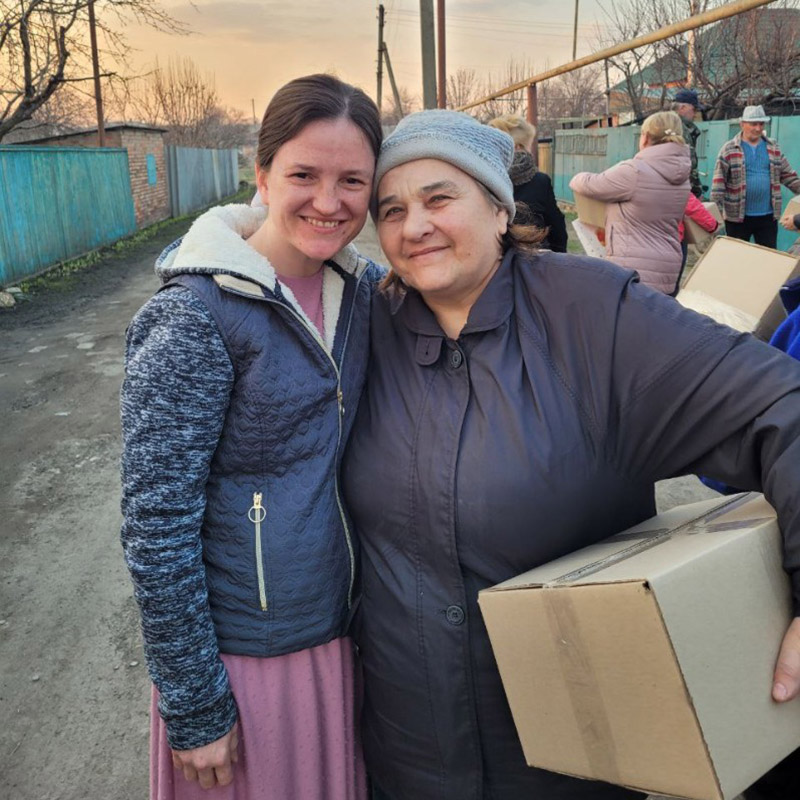
Gratefulness radiates from the faces of food parcel recipients.
In a world of war, so many people feel forsaken. For over a year now, they have lived under pressure and stress. “I couldn’t sleep for several hours last night,” said one babushka. “The explosions were so loud. I was scared.” A smile softened her face. “But today you came. You brought us hope.”
A babushka hugged Jenny close. “Your faith is shown by your works,” she said. “Thank you so much!”
“Now I know that God cares about me,” another babushka declared as she received her food parcel.
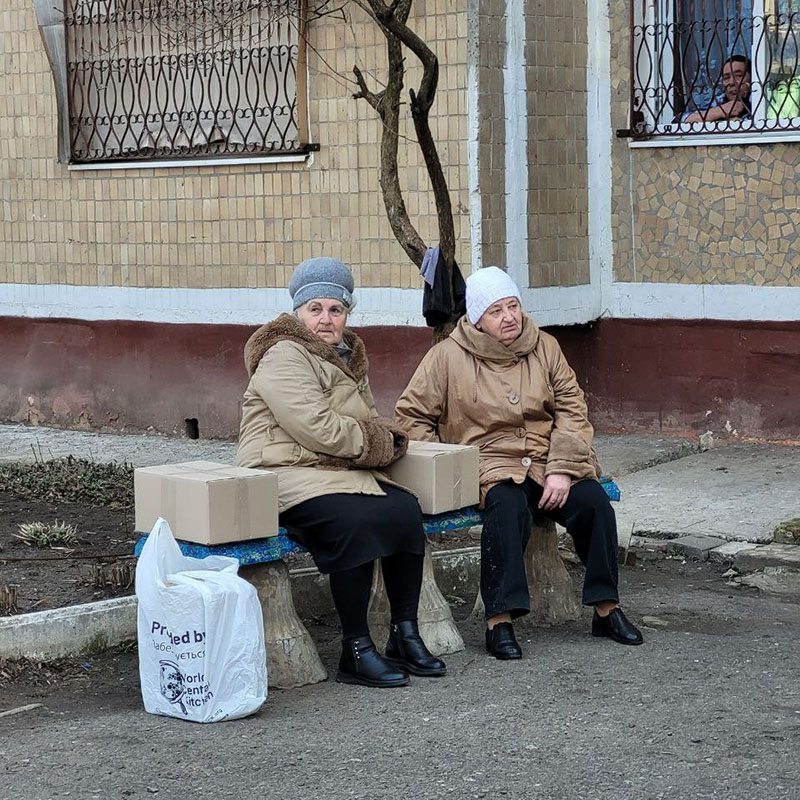
A food parcel provides hope for the elderly and others concerned about what their future holds.
War is no respecter of persons. I thought about this as I saw an older woman who seemed to be a stroke victim. Her right hand hung limp by her side. After the service she asked us if we could help her obtain an electric wheelchair.
Then there was the woman whose face was disfigured by a tumor, and the diabetic who listened to our service through the window of his apartment. He spends his days in a wheelchair since one of his legs was amputated. Another lady could not carry her food parcel because her arm was bandaged. She said it had been hurt from shrapnel. It is people like these who feel especially vulnerable and alone.
The food parcels give so much more than carbohydrates and protein. They symbolize the love and care of Jesus. They offer hope. The literature inside nurtures their souls long after the food is gone. And hopefully heaven will be fuller because God worked through the food parcel project to draw souls to Himself.
One of our theme songs on this past trip to Slavyansk was “God Will Take Care of You.” At one meeting, a man interrupted the service. “You say that God will take care of us. But where was He when the children were starving to death in Mariupol? Does He not see the innocent women and children who are suffering?”
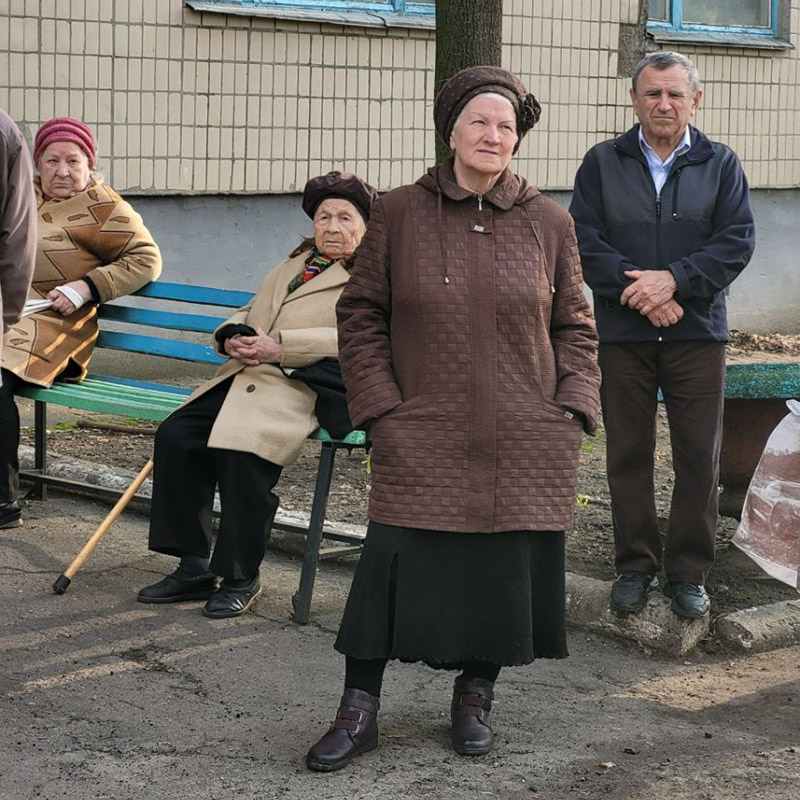
At some meetings, Ukrainians wrestle with hard questions that result from the pain and suffering they witnessed or experienced.
He asked a hard question, and his tone rang with bitterness as he challenged us with a question we all wonder about at times.
A woman from the crowd answered, “God hasn’t forgotten us. We’ve forgotten Him.” It is a sobering thought. The war rages, not because God has forgotten us, but because nations have forgotten Him. “We can’t expect peace to reign in our country until God’s peace keeps our hearts,” Brother Genna said.

We pray that God will mend the broken hearts and shattered dreams.
Sin is the cause of suffering, and at times, the innocent must suffer for another’s sin. But even in the midst of suffering and pain, we are not alone. God has not abandoned us.
However, when driving through the city of Lyman, one could wonder where God is. What was once a beautiful city is now a graveyard of broken buildings, broken lives, and broken dreams. Before the war, the population of the city was over 30,000. Now only 3,000 people remain. For quite a few months Lyman was under Russian occupation. Now it is liberated, but the freedom feels fragile as the Russian army is once again nearing. The future looks dim.
A ray of light shines through the darkness in that city. Under one of the damaged apartment buildings is an abandoned bar that has been turned into a “lighthouse.” A group of believers set up a warming station there. Every morning people come for a hot cup of tea or coffee and a sandwich or sweet bread. Babushkas come carrying their dainty teacups. Old men come with their chipped coffee cups. And each one carries a story.
Many of the stories are heartbreaking. Loss and suffering are these people’s close companions. But among the stories of sorrow are stories of hope, stories of God with His people.
“I want to tell you something, but I am afraid you won’t believe me,” one babushka told Alla, the volunteer cook at the warming station. “One night the fighting was really bad. Bombs were falling all around. I was in my cellar alone. I cried and prayed to God for protection. I recited Psalm 23 and Psalm 91 again and again. Suddenly, I saw a light in the darkness. A bright light filled my cellar, and I knew I wasn’t alone.” She looked searchingly at Alla. “Do you believe me? You won’t laugh at me and say I’m losing my mind?”
Alla blinked back the tears that filled her eyes. “Of course, I believe you!” Alla told me this story a few days later when we visited the warming station. “These people are not suffering alone,” she said. “God is here with them. God is here with us. It’s dangerous, yes, but I have peace. I know that even if a missile would come right now and all of us would lose our lives, it would still be worth it all.”

Refugees operate a warming station to cook for others in need.
It is a brave group there at the warming station. A number of the core group of volunteers are refugees themselves who lost their homes or had to relocate because of the war. They are the ones whose vision birthed this project and keeps it going. Every week other volunteers come and help them.
Last week our group of volunteers who had been delivering food parcels helped them for a day. We arrived in the evening as things were slowing down. The cooks were cleaning up the kettles and preparing the vegetables for the next day. “We made 140 liters of borsch today,” Alla said, pointing at the enormous pots. “I was afraid it wouldn’t reach. People kept coming and coming. But, thank God, it held out just right.” Cooking in primitive conditions for 400 people a day is not for the faint of heart. Forty kilograms of carrots and twenty kilograms of onions were peeled and chopped in preparation for the following day’s meal.
We ate supper with the rest of the volunteers, and then had evening devotions and prayer time together.
We knelt in prayer on hallowed ground. Safety and protection are gifts we dare not take for granted.

A man enjoys a warm meal received at the warming station.
Earlier that day the group that had been taking hot food to a nearby village was shot at. Miraculously, no one was hurt. The windshield was shattered, and everyone was unnerved, but God had kept them from harm.
We do not always see the light in the darkness, but we can rest assured that the same God who was a light to that lonely babushka in the cellar will be our light today. No matter what storm or war we find ourselves caught in, we can take courage. The God of Psalm 23 and Psalm 91 still hears and answers prayer. He is with us in our suffering.
Our hearts are humbled by God’s gracious protection again and again. The danger is real, but so is God’s presence. We feel the prayers of the believers. While you pray, God works. Thank you for joining us in prayer.
Note: This project is not implemented by CAM, but CAM supplies large amounts of food for the food parcels that are bring distributed.
Written by: Anya Hursh, a CAM contact
To help support the Ukraine Crisis program, please click below to give a one-time gift.


